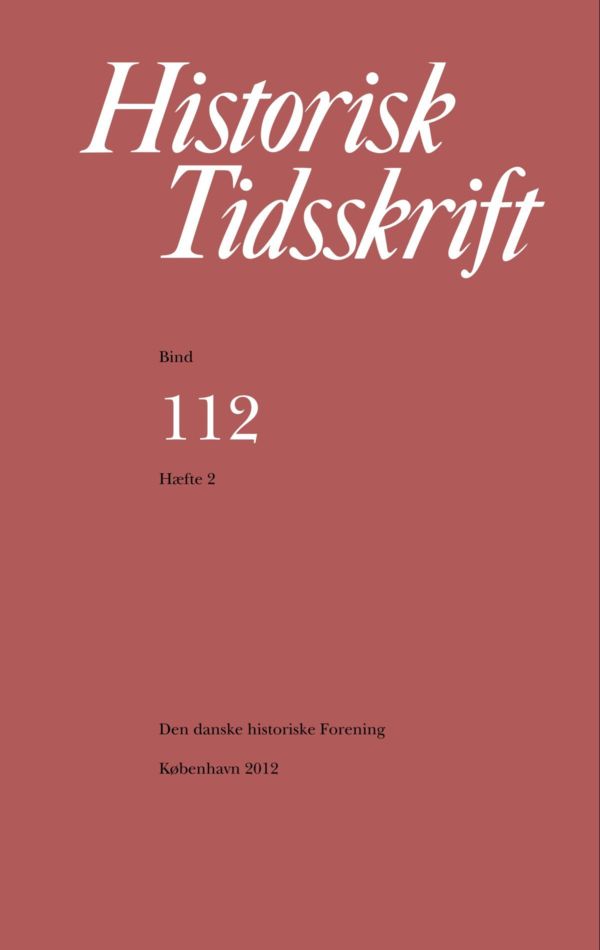Cement og politik. Gunnar Larsen som minister 1940-1943
DOI:
https://doi.org/10.7146/ht.v112i2.56635Resumé
Cement and Politics Gunnar Larsen as a Cabinet Minister, 1940-43Gunnar Larsen (1902-1973) was raised to be an engineer, a businessman, and a successor to the throne of F.L. Smidth & Co., then and now one of Denmark’s leading industrial corporations, which his father had co-founded in the 1880s. However, he is primarily known for his short-lived political career during the years of German occupation when he became a fervent supporter and facilitator of a policy of active co-operation with the occupying power. As a minister for public works, and in close collaboration with Foreign, later Prime Minister Erik Scavenius, Larsen initiated a series of projects intended to prove the Danish government’s willingness and ability to work closely with the NS regime. As the war drew on and the Allies slowly gained the upper hand, Larsen’s activism made him increasingly unpopular, and after the government’s withdrawal in August 1943, he became a primary target of resistance propaganda. In July 1940, the Danish government was re-shuffled in order to strengthen the political basis for handling the German occupation, which had taken place on April 9. Gunnar Larsen was appointed minister for public works and immediately stepped down from his position as CEO of F.L. Smidth & Co., which he had occupied since 1935. Yet, he retained control of the corporation. The government’s agenda was to secure Denmark’s survival through co-operation with Germany. To Gunnar Larsen, this entailed not only close co-ordination in a political and diplomatic sense but also doing business on a corporate level. In this perspective it made no sense to separate politics and business; indeed, to Gunnar Larsen, economic co-operation was crucial in smoothing relations with the German government, and he perceived his business background as a strength and a resource. In this, he was in line with the strong technocratic trend of those years. The workings and efficiency of the political system were supposed to benefit from an increased involvement on the part of ‘non-political’ professionals, albeit at the expense of democratic control. His appointment very likely resulted from Prime Minister Stauning’s wish to accommodate national right-wingers – including an influential circle of technocratically minded engineers – as well as the king, who also wished for a representation of ‘non politicians’ in the government. What Gunnar Larsen saw as a strength increasingly became a weakness in the government as well as in the public sphere. Most of the extensive job creating measures he carried out as a minister for public works necessarily involved the use of great amounts of cement – the primary produce of F.L. Smidth & Co. Gunnar Larsen thus became an easy target for Communist propaganda, picturing him as the perfect capitalist who supported Fascism out of economic interest. At the same time, Gunnar Larsen’s frequent travels to Germany and the various projects he carried out in co-operation with Berlin called forth criticism from a growing number of critics on both political wings who found that he went too far in his attempts at obtaining German goodwill. The initiatives included negotiations for a customs and currency union, the projecting of a transportation corridor between Northern Germany and Copenhagen and an attempt at establishing Danish business interests in the German occupied parts of the Soviet Union (including an F.L. Smidth & Co. cement plant in former Estonia). He spent the last 15 months of the occupation in Sweden and was arrested after having returned to Copenhagen in May, 1945. Although a Copenhagen city court prison sentence for economic collaboration was reversed, he had no future in Danish business life. He was ousted from F.L. Smidth & Co. and later emigrated to Ireland. Gunnar Larsen’s history as a succesful business leader who failed as a politician as well as his postwar fate not only testify to the change in public opinion during the war but also to the fact that critics of parliamentary democracy had been silenced. A democratic consensus prevailed. Thus, Gunnar Larsen’s downfall also signifies the end of the technocratic movement in Denmark and the return of businessmen to business.Downloads
Publiceret
Citation/Eksport
Nummer
Sektion
Licens
Ophavsret til bidrag i Historisk Tidsskrift tilhører forfatterne og Den danske historiske Forening som udgiver af Historisk Tidsskrift. For illustrationer gælder den ophavsret, som står anført i billedteksten. Ophavsretslovens almindelige bestemmelser gælder, hvilket vil sige, at ophavsretten gælder i 70 år efter forfatterens død. Bidrag i Historisk Tidsskrift må derfor, med forbehold for en ”moving wall” på tre år, frit downloades, læses, gemmes, anvendes og citeres (med kildeangivelse) i privat og videnskabelig sammenhæng, men de må ikke helt eller delvis genudgives af tredjepart, heller ikke i redigeret form, uden tilladelse fra forfatterne og Den danske historiske Forening. Henvendelse skal i så fald rettes til Historisk Tidsskrifts redaktion på histtid@hum.ku.dk.





